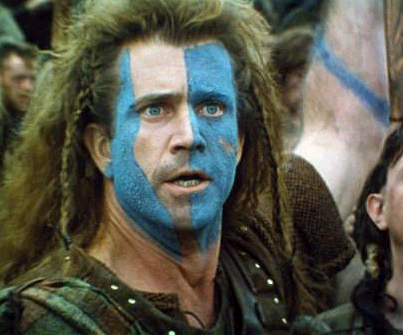Movie Review: Braveheart

Braveheart is an interesting study in Oscar history, considering the film opened in May of 1995 and was met with a somewhat indifferent box office response, coming in second well behind Casper for the Memorial Day weekend. Mel Gibson’s second feature as director (his first was the very good The Man Without A Face) looked to be a so-so hit that would quietly vanish…but it didn’t.
It’s the story of 13th-14th century Scottish freedom fighter William Wallace (Gibson) and how a peaceful, yet worldly man became the unofficial commander of an unorganized army of countrymen, becoming a legend in the process. The film suggests that Wallace’s thirst for battle comes from the murder of his wife, Murron (Catherine McCormack), after they married in secret to avoid the dreaded “First Night,” in which English lords were given the right to sleep with a new wife before the husband.
Orchestrating this evil deed, and many more atrocities, is King Edward the Longshanks (Patrick McGoohan), who has been trying to keep the United Kingdom under his rule, hopefully passing along a dynasty to his son Edward, the Prince of Wales (Peter Hanly).  Longshanks arranges a marriage between Edward and a French princess, Isabelle (Sophie Marceau), but the film more than hints that the son is gay, and played with such wimpy fagginess by Hanly, Gibson got his first taste of controversy.
After Wallace’s wife is slain, he leads impromptu battles, and through heart and soul, the Scots make progress through England. Joined by his friend Hamish (Brendan Gleeson) and an Irishman named Stephen (David O’Hara, who steals the movie), it looks like a certainty. Despite that, Wallace’s one impossible task is making the Scottish lords believe in the war, unable to get the sympathetic Robert the Bruce (Angus Macfadyen) to unite the clans, and therefore, unite all of Scotland to the cause. Wallace will have to be Jesus. In the meantime, there’s no harm in fooling around with the gay guy’s wife, as Wallace finds time to do.
Braveheart is one of those movies that is easy to like, with lots of action, drama, and good doses of humor. It has a lot of ridiculous lines that defined writer Randall Wallace (who is apparently a descendant of William) with later scripts such as The Man in the Iron Mask and Pearl Harbor. You know, easy-to-digest stuff like “Every man dies, not every man truly lives,” that’s easy to agree with, not too profound, but fits the picture. It’s an overall very good experience, especially on a big screen.
To this day, I’m not really sure how Braveheart won, other than there was an ardent fan base for the film, and it got a re-release later in the year for consideration, but it still ended up well short of $100 million (domestic; it made more than $200 million worldwide). It had the qualities of Best Pictures past and present: it was an overall decent hit, it had some critical praise, and it was an epic, but how this film beat Ron Howard’s Apollo 13, which more than doubled Braveheart’s gross and was almost universally praised by critics, and on top of that, with the Oscars recognizing longtime Hollywood vets Steven Spielberg and Robert Zemeckis in the two previous years, Ron Howard and his Apollo 13 somehow entered Oscar night as underdogs.
Other nominees were Babe, a surprise entry into the category, along with Ang Lee’s superb Sense and Sensibility and Michael Radford’s sweet Italian drama Il Postino (The Postman, not to be confused with Kevin Costner’s unintentionally hilarious epic two years later). My personal favorites, such as David Fincher’s Seven and Bryan Singer’s The Usual Suspects, didn’t make the cut here. Dead Man Walking also got snubbed, probably part of the Academy’s conservative we-hate-Tim-Robbins-and-especially-Sean-Penn movement going on at the time.
Braveheart also may have not been the favorite Scottish swords-and-skirts epic in some circles that year, as Rob Roy had quite a following. It just wasn’t a big hit, and it certainly didn’t have that much of a fan base. Anyway, the Academy went with the usual choice here; it’s a good film (hell, I own the thing on laserdisc), but if you’ve seen all the copycats in recent years, this might seem like just another Kingdom of Heaven or Gladiator.Â
Comments
Comment from Doc
Time: January 25, 2007, 11:37 am
The authenticity, reverence, and sweat that Gibson put into this little-known tale of early Scotland was enough to carry this film to the top of my list of 1995 (although it would be around 3 or 4 in the year before). Gibson’s superb Scottish brogue alone puts a “seal of authenticity” on it. How many movies do we have to watch in Germany, France, or Italy where all the actors have a British acecent, and don’t even try to pick up the local dialect?
It showed camaraderie and leadership at its purest, and I’ve rarely seen it depicted as well as it was here since. Great film, and one of the only movies of this length that I can watch over and over again.
Write a comment
You must be logged in to post a comment.
Comment from Jonathan Watkins
Time: January 21, 2007, 12:36 am
I have convinced very few of this fact, but “Rob Roy” was a much better film along with all four of the fellow nominees. “Roy” has the greatest sword fight in the history of film; those who have not seen it watch it and I dare you to tell me I’m wrong. You already mentioned three other heavyweights with “Suspects,” “Seven,” and “Dead Man Walking.” “Leaving Las Vegas” was another powerhouse that year. But after all that, I guess “Braveheart” was an okay choice. It was a good film, but the best of the year, not even close.